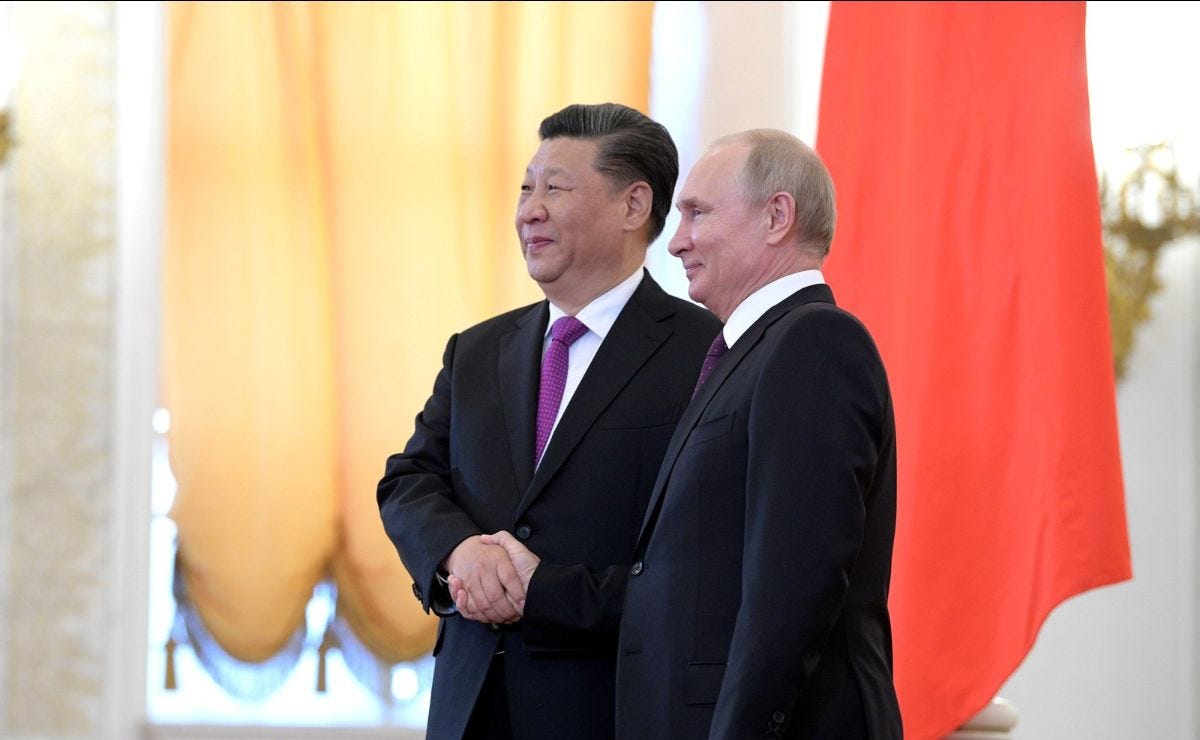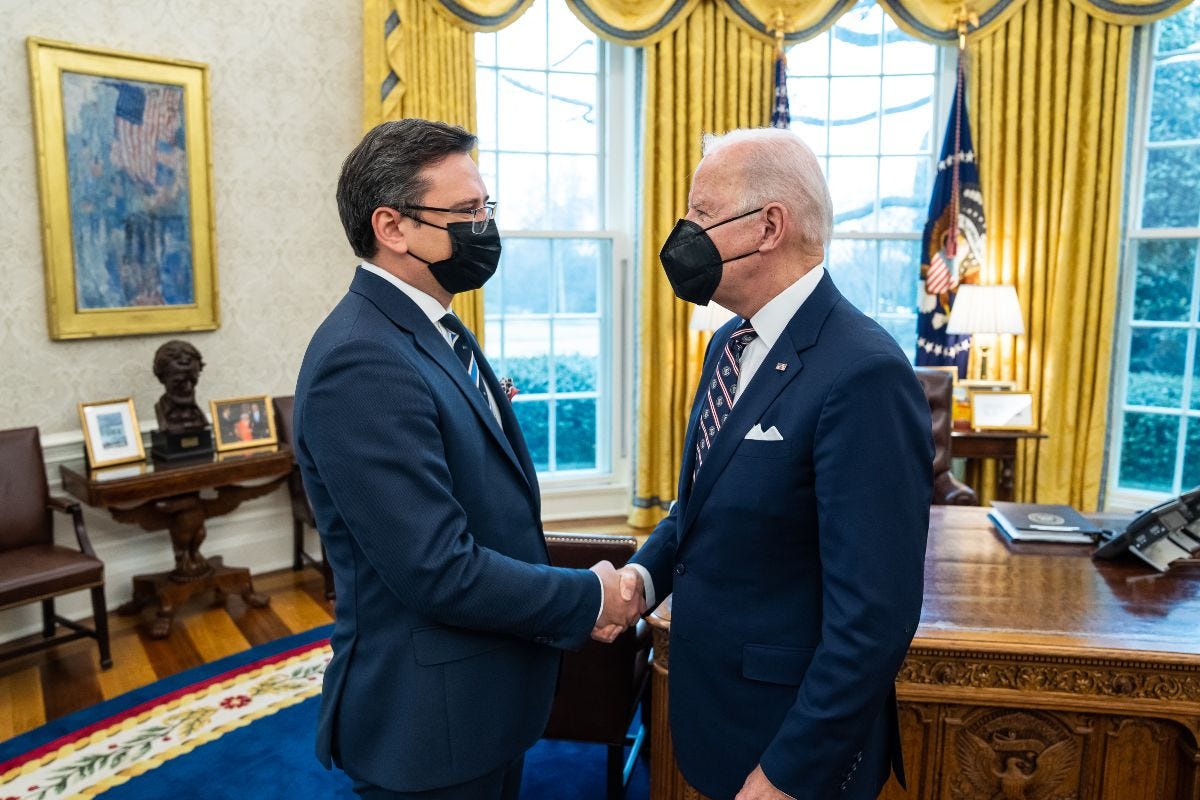Wake Up To Politics - February 23, 2022
Wake Up To Politics: Why Putin invaded now
by Gabe Fleisher
Good morning! It’s Wednesday, February 23, 2022. Election Day 2022 is 258 days away. Election Day 2024 is 986 days away.
We’ve got more of the latest from Ukraine for you in this morning’s newsletter. First, I’ll give an update on how the U.S. is responding to the conflict. Then, contributing writer Miles Hession will offer some analysis to answer a key question: why did Putin decide to invade now?
How the U.S. is responding to Putin
In Tuesday’s newsletter, I asked what I said would be the central question of the day: Would President Biden deem Russia’s movement of troops into two separatist regions of Ukraine to be an “invasion” of the country?
White House aides had waffled on the question in the hours after Russian President Vladimir Putin’s announcement, but it was an important one, because Biden had said only an invasion would trigger the “swift and severe” sanctions he’d promised to impose against Moscow.
Later in the day on Tuesday, in a speech that began at 2:22 p.m. on 2/22/222, Biden put an end to the mixed signals from his advisers and offered a definitive answer.
“This is the beginning of a Russian invasion of Ukraine,” the president declared.
Here’s what else you should know about the Ukraine crisis and the American response:
— Biden’s new sanctions. After labeling the Russian movement an “invasion,” Biden then moved to announce what he called America’s “first tranche of sanctions” in response. Biden announced sanctions against two state-owned Russian banks, three Russian elites and their family members, and Russia’s sovereign debt (which effectively cuts off Moscow from Western financing).
Lawmakers on both sides of the aisle called on Biden to impose even harsher sanctions; some have even begun drafting packages of their own. The sanctions are likely to impact the U.S. economy too, in the form of higher gas prices and continued supply chain shortages.
— Shrinking hopes for diplomacy. Secretary of State Antony Blinken canceled a planned meeting with Russian Foreign Minister Sergey Lavrov on Tuesday, further dwindling the likelihood of a diplomatic resolution even as Biden and Putin both reiterated they were open to one.
In his remarks, Biden sounded confident the conflict would only be escalating. “Russia has moved supplies of blood and medical equipment into position on their border,” he said. “You don’t need blood unless you plan on starting a war.
— U.S. troop movements. Biden also announced troop movements of his own, aimed at boosting the security of Russia’s American ally neighbors. The president said these troops, currently stationed in other parts of Europe, would move to Estonia, Latvia, and Lithuania — three NATO allies that border Russia.
— A divided GOP. Republicans of all stripes have criticized Biden’s response to Putin, but the party is otherwise divided on its Ukraine stance. Some Republicans, such as Sen. Josh Hawley (R-MO) and Ohio Senate candidate J.D. Vance, have staked out a firm “America First” position, calling for the U.S. to refrain from any involvement in the region. For his part, former President Donald Trump offered praise for Putin on Tuesday, calling his actions “genius.”
Why did Putin invade now?
Here’s another key question when it comes to Putin’s decision to invade Ukraine: Why now?
WUTP’s global contributor, Miles Hession, writes in with this analysis of the factors that led Putin to choose this moment to strike:
Domestic politics. Considerations at home seemed to be top of mind for Putin, as the government has continued opposition crackdowns in the past year. The arrest of pro-democracy activist Alexei Navalny and heavily contested elections in 2021 led to increased scrutiny for the often inscrutable Putin. Soaring approval ratings that Putin experienced after the Crimea invasion could be an attractive memory that Putin is looking to replicate.
Putin’s claims that his forces are “peacekeeping” against advances by Ukraine and its Western allies also tie in to his broader narrative of an aggressive NATO encroaching on the Russian people, which he has weaponized in the past in attempts to unify his population.

Support from China. Even with the threat of harsh sanctions, China’s recent extension of partnership between the two nations offered an economic saving grace. Following the tranche of sanctions after the 2014 invasion of Crimea, Russia’s economy began turning inward and became more insular, able to better persevere a harsh global economic backlash.
With this already more secluded economy, and China doubling down on its alliance with Russia and thus keeping its large markets open with the country, Russia’s economy was in a better position to endure sanctions, which certainly played into Putin’s calculus.
A divided West. Since Putin’s announcement, most Western countries have been unified in their response to Russia. But in the previous weeks, Western leaders were giving different signals. German Chancellor Olaf Scholz, for example, refused to publicly stated he would halt the Nord Stream 2 pipeline (which he has since done).
French President Emmanuel Macron had also signaled he was willing to grant Putin some concessions, going further than other leaders. But those divisions have mostly fallen away since Russia moved troops into eastern Ukraine. Putin hadn’t “been counting on” such a unified Western response, Biden said Tuesday.
In Tuesday’s newsletter, due to an editing error in my part, the “Education Roundup” mistakenly referred to “American-Americans” when it should have read “Asian-Americans.” My apologies for the error.
All times Eastern.
President Joe Biden and Vice President Kamala Harris will receive their daily intelligence briefing at 3:30 p.m. Biden has no other events on his public schedule; Harris will also hold a meeting at 5 p.m. with the National Black Caucus of State Legislators.
First Lady Jill Biden will travel to San Antonio, Texas today. At 1:45 p.m., she will visit the Mays Cancer Center as part of her role in the Biden administration’s Cancer Moonshot initiative. Biden will tour the facility and attend a listening session on addressing cancer health disparities in the Latino community.
At 3:30 p.m., she will visit Joint Base San Antonio-Lackland as part of her Joining Forces initiative to support military families. Biden will participate in a listening session about military children with disabilities.
White House Press Secretary Jen Psaki will hold her daily press briefing at 2:30 p.m.
The House and Senate are both on recess.
House Speaker Nancy Pelosi will hold her weekly press conference at 11:30 a.m.
The Supreme Court will hear oral arguments at 10 a.m. in Arizona v. San Francisco, a case stemming from the Biden administration’s decision not to defend the Trump-era “public charge” rule against federal lawsuits. According to SCOTUSBlog, the rule “broadened the definition of ‘public charge,’ a term in immigration law for people who are ineligible for a green card if the government believes that they are likely to rely too heavily on government aid.”
The case today is not about the legality of the rule. Rather, it will consider whether states — in this case, Arizona and 12 others with Republican attorneys generals — can step in to defend a rule (such as the Trump-era “public charge” changes) in court if the federal government opts not to.
That’s it for today. If you enjoy Wake Up To Politics, it’s always appreciated if you donate to support the newsletter or buy some merch. Or if you tell your friends and family to sign up at wakeuptopolitics.com.
If you have any questions or feedback, feel free to email me: my inbox is always open.
Thanks for waking up to politics! Have a great day.
— Gabe




